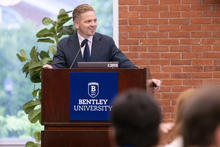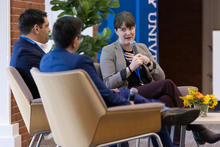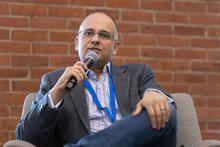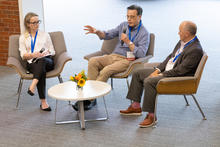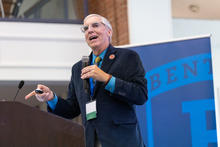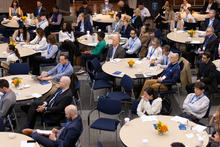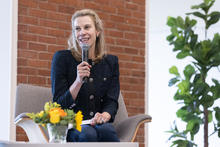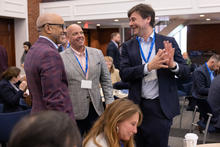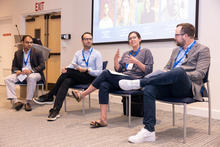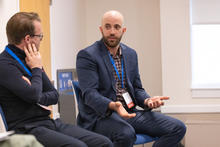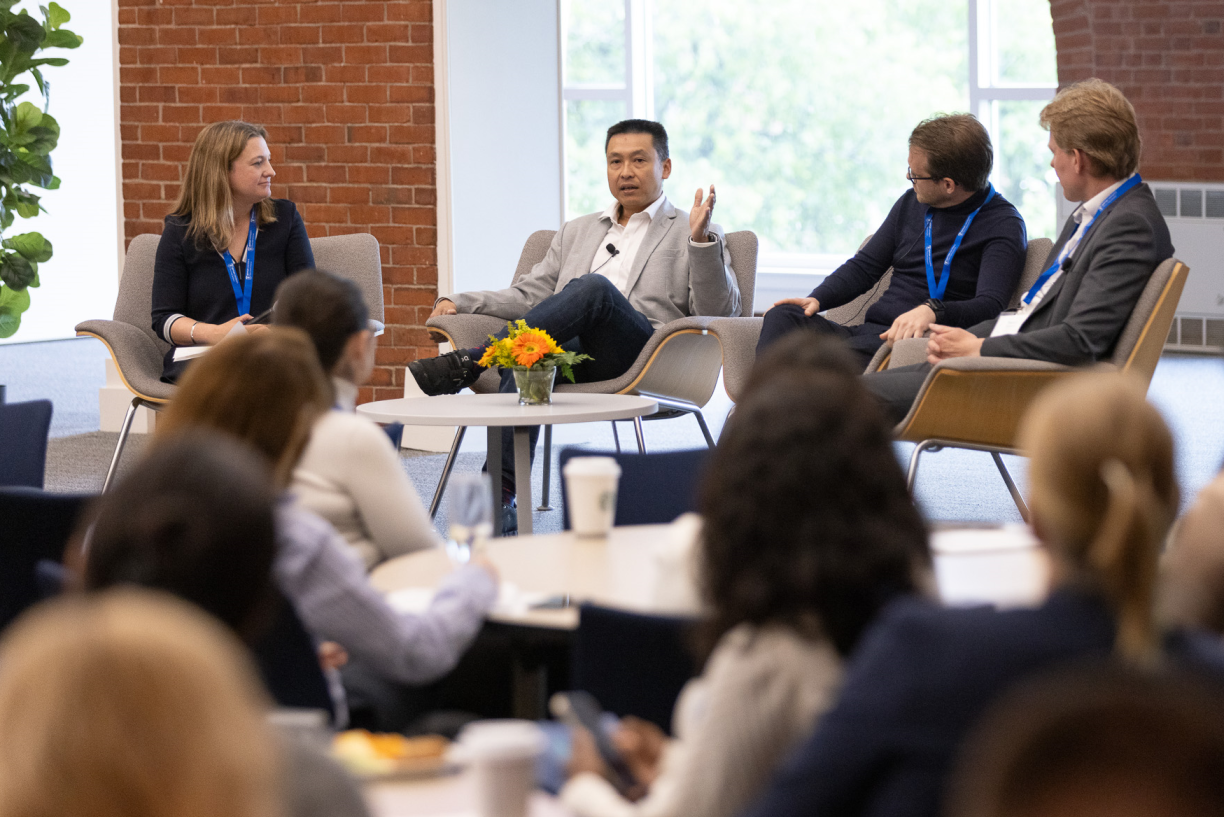
Center for Health and Business Hosts International Summit on AI in the Life Sciences Industry
More than 100 global changemakers from academia, government and the private sector convened on Bentley’s campus this May for the “Global AI Summit on Life Sciences: Accelerating the Business of Health,” a day-long symposium presented by the university’s Center for Health and Business in partnership with Altruistic AI, a human-driven data science and artificial intelligence (AI) consultancy with offices in Boston, London and Milan, and Future Talent Council, a Stockholm-based international think tank that’s been hailed as “the World Economic Forum of talent.”
Local partners Health Universe, committed to enabling open-source models and proprietary applications utilizing AI in health care to advance science and benefit humanity, and Massachusetts Life Sciences Center, an economic development and investment agency that supports industry growth through public-private funding initiatives, co-sponsored the event, which explored opportunities and challenges associated with AI-driven digital transformation in the life sciences industry.
“Artificial intelligence has the potential to transform the business of health and improve patient outcomes by advancing medical research and practice, improving administrative efficiencies and identifying personalized treatment regimens,” says Danielle Blanch Hartigan, executive director of the Center for Health and Business and an associate professor of Natural and Applied Sciences. “But AI innovations carry risks as well as rewards; mitigating those risks in the life sciences industry will require a comprehensive and cross-disciplinary approach.”

Through keynote speakers, roundtable discussion and breakout workshops, the summit touched on a variety of topics addressing the ethical, educational and entrepreneurial implications of AI use. One key point on which all panelists agreed: AI should be viewed as a supplement to, and not a substitute for, human ingenuity. As Robert Maguire, co-founder and CEO of Altruistic AI, has noted, “AI has a seat at the table, but it’s not the table.”
This is particularly true of generative AI platforms, like ChatGPT, which analyze massive data sets to produce original content, such as text, images and music. Because these models are trained on historical, human-generated data, their algorithms may reflect and perpetuate racial, gender and other socioeconomic inequities; given the significant and well-documented health disparities that currently exist in U.S., the need for human oversight of AI use in the life sciences industry is critical for ensuring ethical and equitable decision-making.
That’s where higher education — another major theme of the summit — comes into play. The rapid pace of digital transformation has left employers and employees alike struggling to identify and acquire the skills necessary to successfully integrate AI within their companies. Beyond the technical expertise required to create and execute machine learning programs, panelists emphasized the importance of developing AI literacy, or the ability to understand, use and critically assess these digital technologies, among current and future workforces.

According to the most recent Bentley-Gallup Business in Society report, 77% of Americans say they don’t trust companies to use AI responsibly and 75% believe AI will reduce the total number of jobs in the U.S. throughout the next decade. These sobering statistics indicate the need for a fundamental shift in the way we think about AI, says Danielle Solar, program director for the Center for Health and Business and the AI Summit’s chief organizer. “From an educational standpoint, it’s imperative that we position AI as a critical thinking companion and problem-solving partner, and not as a replacement for human creativity,” she says.
During a panel discussion, Solar spoke about partnering with Altruistic AI to offer Bentley students, staff and faculty a customized, health industry-related course in prompt engineering, or how to create specific inputs, or prompts, for generative AI models that produce optimal outputs. After taking the Prompt Pilot course, which consisted of four asynchronous modules, Bentley participants demonstrated a 40% improvement in their understanding of and ability to successfully use AI, she shared. “Prompt engineering encourages generative AI users to engage in creative and critical thinking,” Solar says, further noting that courses that provide hands-on learning experiences using real-world examples “empower students to use AI more confidently and responsibly.”
Panelists also discussed the ways AI can enhance entrepreneurial thinking, particularly in heavily regulated industries like the life sciences. Using AI to streamline complex processes — for example, preparing preliminary documents for medical, legal and regulatory (MLR) review — can not only enhance operational efficiency, but also free up time that can be used for higher-level creative thinking. AI can also accelerate innovation by identifying patterns in unstructured data sets that spark novel solutions for existing problems and generate new business opportunities.
RELATED: Explore more Bentley-Gallup survey findings
With the global AI market projected to reach $900 billion by 2026, it’s clear that AI is here to stay and will continue to transform the way students learn, educators teach and companies operate. Business schools like Bentley will play a pivotal role in ensuring that AI is leveraged in ways that benefit society, Solar says, by prioritizing a human-centered approach to innovative and disruptive technologies. “At the end of the day, the life sciences industry is fundamentally about helping people,” she explains. “Empathy, compassion, understanding of cultural differences — all of these are essential qualities for advancing human health and wellbeing and they can’t be replicated by machines.
“The Center for Health and Business and Bentley University are proud to contribute to thoughtful conversations around the ethical, equitable and sustainable use of AI in the life sciences industry,” Solar continues. “We look forward to working with our corporate and community partners to explore comprehensive strategies that position AI as a force for good.”
Unable to attend?
Contact the Center for Health and Business for a white paper featuring insights from the AI Summit’s international panel of experts.


